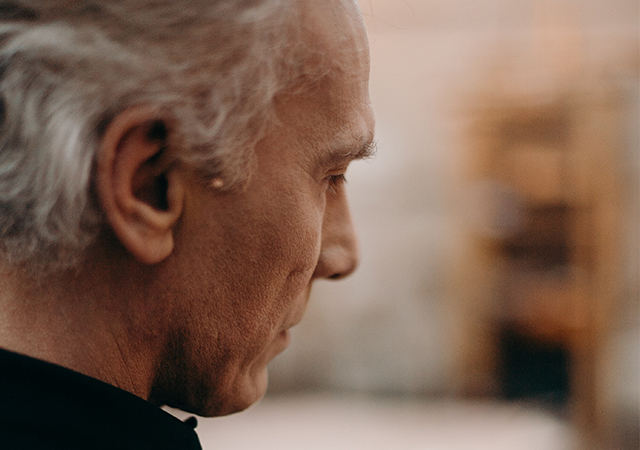Caregiver Change
and Loss
Challenges faced by Caregivers following a brain injury may include dealing with change and loss, intense and mixed feelings and emotions, caregiver burden, caregiver stress, and caregiver burnout.
Listen to Brenda as she talks about the financial, physical, and emotional costs of caregiving.
Caregiver Change
and Loss
Challenges faced by Caregivers following a brain injury may include dealing with change and loss, intense and mixed feelings and emotions, caregiver burden, caregiver stress, and caregiver burnout.
Listen to Brenda as she talks about the financial, physical, and emotional costs of caregiving.
Since the brain injury
you may have noticed:
An increase in stress and responsibility
A loss of support and companionship
A decrease in your ability to work and have a social life
Financial difficulties
Concerns about health problems and what the future will bring
Less time for other family members and friends
Changes in plans for your future
Which of the following have
you noticed?
Feeling down, blue, or hopeless
Crying spells
Sleep problems
Low energy or getting tired easily
Restlessness
Wondering whether life is worth living
Feelings of worthlessness
Feelings of guilt
Irritability or frustration
Eating a lot more or less
Worrying about the future
Difficulty making decisions, concentrating or remembering
Not enjoying things like before
Keeping to yourself
*** If you have checked several items, it is important that you talk to someone you trust, or seek support.
Some strategies to cope with change and loss as a caregiver are:
Be kind
Understand the new responsibilities
and talk about the challenges related to these new roles
Self-Care
Self-care, eat properly, get enough sleep, and remain active
Ask for help
Ask for help, and accept it when it is offered
Let Go
Let go of some responsibilities when you take on new ones
Speak with professionals
Speak with professionals about your concerns
Focus on yourself
Focus on your successes, strengths, and resources
one step at a time
Take one step at a time and set goals for each day
Join support groups
Join a caregiver support group or access a peer mentor
Realize this is normal
Realize that your feelings are a normal response to a difficult situation
appreciate patience
Appreciate the value of patience and persistence
Be Positive
Be hopeful and positive
Caregiver Feelings and Emotions
After a brain injury, caregivers often go through an emotional recovery as they begin to feel okay about themselves and their life again. The following are emotions you may be currently experiencing or have experienced in the past. All of these emotions are normal; however, it is important to seek support if you find them overwhelming.

Denial
Accepting what is a new reality, often brings intense emotions. Denial is a way of protecting yourself from something that is too painful to absorb.
To help manage this emotion, share your experience with someone you can trust. Telling your story repeatedly may help you to cope and accept what has happened.
Fear and Anxiety
Fear and anxiety are common following a brain injury and it can be difficult to tell them apart. Fear is a response to a threat that you can identify, whereas anxiety occurs when you are trying to control an unpredictable situation (i.e. the future, living with emotional, financial, and social change).
To manage fear and anxiety, it is helpful to determine the concerns causing these emotions. Also, educating yourself about brain injury and focusing on solutions will help minimize your fear and anxiety.


Anger
Anger is a normal response to the loss of something or someone that is valued. Hurt, pain, frustration, and fear are often underneath feelings of anger and may appear as impatience, resentment, and withdrawal. Caregiver anger may result from:
- Changes in your life and the losses you have experienced
- An increase in your physical and emotional burden
- Feelings of abandonment
Managing anger can be difficult, but recognizing and accepting it can help. It is important to forgive yourself for experiencing anger, and to create a safe place for you to express it. Find people who will listen and support you if you need to “vent” about your day and give yourself the opportunity to walk away if you are overwhelmed with a situation.
Resentment
Resentment may occur when someone is “giving” too much and it becomes burdensome. When you feel this way, it may impede your ability to be a good caregiver to your loved one.
Important strategies to help manage feelings of resentment include: finding time for yourself to participate in activities that you enjoy, getting enough rest, setting limits, communicating with honesty, and being comfortable to say “no”.


Guilt
Guilt is a natural emotion felt in a caregiving situation and can happen regardless of your efficiency in providing care. Feelings of guilt may originate from:
- Disappointment with yourself as a caregiver
- Thoughts of regret and feeling that you could have done more to prevent the situation
- Comparing your health to the health of the person you are caring for
Strategies to manage feelings of guilt include recognizing your feelings of guilt and stop blaming yourself, speaking with a supportive and understanding person, accessing professional support if needed, acknowledging that guilt is not always bad because it can help you change in positive ways, and ask yourself “what did I do that was right and good”.
Grief
Grief is a natural response when you lose important parts of your life. Everyone experiences grief in different ways and no way is right or wrong. Grief can bring on many strong emotions such as loneliness, frustration, anxiety, fear, anger, resentment, sadness, guilt, and depression. Denying yourself permission to feel these emotions may complicate your grief and prevent you from healing.
To manage feelings of grief, express it in constructive ways such as writing and stress reducing activities. Speak with someone who understands your feelings and access support from your friends, family, and support groups. It is important to give yourself permission to cry if you feel you need to.
There are three tasks to grieving:
1. Accept the reality of the loss
2. Work through the pain
3. Adjust to your losses and accept what you can’t change


Depression
It is important to know that caregivers have a higher incidence of depression, especially among caregivers of adults with a brain injury. The two most relevant types of depression for caregivers are grief-related depression and clinical depression. Depression is a natural response to loss. It is important to know the difference between the two types of depression and to know when to seek help. Grief-related depression is the depression experienced as a result of a loss or traumatic event. Whereas, clinical depression is a more severe and ongoing depression that often requires treatment and support from a medical professional.
There are several strategies for managing symptoms of depression. Cognitive behaviour therapy and interpersonal therapy are effective in treating symptoms of depression. It is important to seek medical attention for feelings of depression, particularly if you feel they are related to clinical depression. The use of alcohol and non-prescription drugs to cope with depression may develop into a habit and are not advised as coping strategies.
Managing Emotions after Brain Injury
Are there certain factors you can identify that made you feel this way?

PROCESS THESE FEELINGS
- Allow yourself to cry
- Draw how you feel
- Talk with someone you trust

PROBLEM SOLVE
- Brainstorm solutions to some of the triggers that may be upsetting you
- What are your resources that can help you?

RELAXATION EXCERCISES
- Practice deep breathing
- Find a guided meditation on Youtube

TAKE CARE OF YOUR BASIC NEEDS
- Walk
- Rest
- Eat
- Shower

MOOD BOOSTERS
- Watch a funny video or movie
- Do something fun
- Go out with your friends

ASK FOR HELP
- Ask someone to be with you or text a friend.
- Seek professional help if you have a difficult time managing your emotions in healthy ways

Caregiver Stress
No matter who you are, stress can have a negative impact on your life. Even though you are dealing with a brain injury, life continues to happen and can provide additional sources of stress. How you feel about your life often depends on how you manage stress.
What is stress?
Stress can be thought of life “carrying a stuffed backpack up a big mountain”, even though you may not add anything to the pack as you climb, the pack seems heavier as you climb higher without rest. For many people, stress is a thought or feeling that you must do something. It often relates to how much you must do and the number of people telling you to do it, the difficulty level of tasks, and your beliefs about the consequences of failure.
Listen to Fran as she talks about long term stress following a brain injury,
What is stress?
Stress can be thought of life “carrying a stuffed backpack up a big mountain”, even though you may not add anything to the pack as you climb, the pack seems heavier as you climb higher without rest. For many people, stress is a thought or feeling that you must do something. It often relates to how much you must do and the number of people telling you to do it, the difficulty level of tasks, and your beliefs about the consequences of failure.
Listen to Fran as she talks about long term stress following a brain injury,
Basic Facts about Stress
No one is immune to stress, and as a caregiver for a person with a brain injury, you are more vulnerable to the negative effects of stress. These effects can add up over time and may weaken your ability to handle new challenges. Sometimes, people do not realize how much stress they are accumulating when they are so busy trying to complete other tasks.
Signs and Symptoms of Stress
Cognitive Symptoms:
- Memory problems
- Inability to concentrate
- Poor judgment
- Looking at things negatively
- Anxious or racing thoughts
- Constant worrying
Physical Symptoms:
- Aches and pains
- Diarrhea or constipation
- Nausea
- Dizziness
- Chest pain and rapid heart rate
- Diminished sex drive
- Frequent colds or flu
Emotional Symptoms:
- Depression or general unhappiness
- Anxiety and agitation
- Moodiness
- Irritability
- Anger
- Feeling overwhelmed
- Loneliness and isolation
- Other mental health concerns
Behavioural Symptoms:
- Changes to eating and sleeping
- Withdrawing from others
- Procrastinating or neglecting responsibilities
- An increase in nervous habits (e.g. nail biting, pacing)
- Using alcohol, cigarettes, or drugs to relax
Stress can have a negative impact
Stress can have many negative impacts on your life, including reduced motivation and productivity, impaired health, and harm to your relationships. These can lead to unhealthy ways of coping with stress such as:
Taking up smoking or smoking more than usual
Drinking too much alcohol
Using pills or other drugs (including illegal drugs) to relax
Overeating or undereating
Zoning out for hours in front of the television or computer
Withdrawing from friends, family, and activities
Negative self-talk
Sleeping too much
Procrastinating
Compulsive spending
Scheduling every minute of the day to avoid facing problems
Taking out your stress on others
(e.g. lashing out, angry outbursts, bullying, physical violence)
Denial
IMPORTANT: IF YOU NOTICE THAT YOU, OR A FAMILY MEMBER, ARE USING UNHEALTHY WAYS OF COPING WITH STRESS, CONSIDER SEEKING THE ADVICE OF A MEDICAL PROFESSIONAL.
Controlling Stress in Your Life
Taking measures to help control stress in your life will help keep you healthy and prevent you from experiencing caregiver burden and burnout. It is important to recognize the amount of stress you are facing and to ask yourself often “how much stress am I feeling now?”. When you are monitoring your stress levels, you can better control your feelings, actions, efficiency, and quality of life.

Grounding Technique:
The 5-4-3-2-1 Strategy
This grounding technique can help bring you to the present moment when you are feeling overwhelmed, anxious, and stressed within your environment. The “5-4-3-2-1” strategy encourages you to be mindful about your environment.
To use this strategy, look around you and name the following:
- Name 5 things you see
- Name 4 things you feel
- Name 3 things you hear
- Name 2 things you can smell
- Name 1 thing you can taste
Caregiver Burden
Caregiver burden describes the physical, emotional, and financial toll of providing care to another person. The amount of burden you feel has an impact on your emotional and physical health, as well as the emotional and physical health of the person you are caring for.
Physical changes, although often difficult, can cause the least burden. Behaviour, personality, and emotional changes often cause the most burden and may be independent of the severity of the brain injury.
Listen to Pierre as he talks about how he and his wife manage stress together.
Caregiver Burden
Caregiver burden describes the physical, emotional, and financial toll of providing care to another person. The amount of burden you feel has an impact on your emotional and physical health, as well as the emotional and physical health of the person you are caring for.
Physical changes, although often difficult, can cause the least burden. Behaviour, personality, and emotional changes often cause the most burden and may be independent of the severity of the brain injury.
Listen to Pierre as he talks about how he and his wife manage stress together.
Listen to Nancy as she talks about the importance of taking time for herself
Follow these tips to help minimize your feelings of caregiver burnout.
- Accept your feelings, your limits and help from others
- Access respite, information about your loved one’s injury, and a caregiver support group
- Deal with the warning signs of burnout immediately
- Take care of YOU – eat well, sleep well, and participate in activities you enjoy and that relieve stress
- Define boundaries regarding what you will and will not do, maybe someone else is better qualified or able to take on some of the responsibilities you are not able to do
- Laugh and maintain a sense of humour throughout your day
- Incorporate relaxation rituals in your life (i.e. meditate, journal writing)
- Cut back on commitments and tasks, delegate them among others who are willing to help
- Grieve your losses and make new goals and dreams
Listen to Nancy as she talks about the importance of taking time for herself
Follow these tips to help minimize your feelings of caregiver burnout.
- Accept your feelings, your limits and help from others
- Access respite, information about your loved one’s injury, and a caregiver support group
- Deal with the warning signs of burnout immediately
- Take care of YOU – eat well, sleep well, and participate in activities you enjoy and that relieve stress
- Define boundaries regarding what you will and will not do, maybe someone else is better qualified or able to take on some of the responsibilities you are not able to do
- Laugh and maintain a sense of humour throughout your day
- Incorporate relaxation rituals in your life (i.e. meditate, journal writing)
- Cut back on commitments and tasks, delegate them among others who are willing to help
- Grieve your losses and make new goals and dreams
Caregiver Burnout
Warning signs of Caregiver Burnout include:
Detachment and Disengagement from your life
Feeling a sense of hopelessness
Lack of motivation
Constantly feeling dissatisfied
Feeling overwhelmed
Withdrawing from friends, family, and activities
Negative self-talk
Constantly feeling exhausted, less energy to do tasks
Change in appetite and sleep habits
Pessimistic views on life
Get sick more easily and often than usual
Irritability or impatience toward the person you are caring for
No longer able to take care of your own needs
Trouble relaxing even when help is available
Compassion Fatigue
Compassion fatigue is a hazard of caregiving and is a more severe form of burnout. It is an extreme stage of tension that accumulates over time as a result from the seemingly endless emotional and physical demands placed on caregivers. As a result of compassion fatigue, caregivers experience a lack of empathy for those they care for and it may manifest through actions such as yelling, hitting, neglect, or other actions that are not typical behaviour for a caregiver.
IMPORTANT: IF YOU FEEL THAT YOU OR SOMEONE YOU KNOW IS EXPERIENCING COMPASSION FATIGUE, IT IS IMPORTANT THAT YOU SEEK HELP FROM A HEALTH CARE PROFESSIONAL.
Caregiver Strategies
Problem Solving
There are five basic steps to problem solving which can help you manage everyday challenges, as well as more significant problems.
1. Define the problem
-
- Identify the problem clearly
2. Brainstorm
-
- List ideas you have that may help solve the problem
3. Pros and Cons
-
- Think about the “pros” and “cons” for each solution
4. Try a Solution
-
- Try the solution with the most “pros” and least “cons”
5. Evaluate
-
- Did the solution work to solve the problem
Some other strategies to help you problem solve include:
- Prioritizing problems and working on one problem at a time
- Ask for help but do not allow others to solve the problem for you
- Provide time for the solution to work and focus on ways to make things better rather than focusing on what is wrong.

Goal Setting
Goal setting is a helpful tool for all caregivers. Using the S-M-A-R-T method will help you to have greater success in achieving your goals.
S
Specific
Be clear about what needs to be accomplished and phrase it in a positive way
M
Measurable
Ensure you can monitor your progress and tell you achieved the goal
A
Achievable
Fits with your strengths and weaknesses
R
Realistic
It is realistic for your current situation
Be flexible with your plan and make changes
T
Timelines
Create specific deadlines to achieve the goal
Plan and break down your goal into steps
Supporting Communication for Loved Ones with Brain Injury: Communication Partner Training
With thanks to Dr. Catherine Wiseman-Hakes for her contribution
Cognitive-communication challenges are common following a brain injury. In fact, it’s been said that people with a brain injury can often ‘talk better than they communicate’. A cognitive-communication disorder refers to difficulties with aspects of communication, i.e. listening, speaking, reading, writing and thinking (because we use language when we think), that are due to underlying cognitive problems. For example, many people with a brain injury have difficulty remembering things, think at a slower rate, and have trouble following and understanding conversations. These challenges can result in a person not remembering the conversation or not understanding all of what was said.

Also, these difficulties can cause challenges in relationships, as well as in the community, at school or at work.
Communication is a two-way process, and both individuals involved in the conversation need to feel comfortable. Communication Partner Training (CPT) is an intervention that focuses on training family members, friends and caregivers, rather than just the person with the brain injury. It has been well researched and found to be very helpful in improving communication. CPT encourages more positive conversations with their loved one who has a brain injury. It is important to speak with a speech-language pathologist about Communication Partner Training; however, the following are some strategies you can use to have a better conversation.
- Speak naturally, do not alter your tone of voice as this can (even when not intended) be condescending
- Keep distractions in the room where you are having the conversation to a minimum
- Ask relevant questions
- Give information when needed
- Show enthusiasm for your partner’s contribution
- Share the conversation
- Give the person time to respond
- Acknowledge when they are having difficulty
- Talk about topics of interest

The University of Sydney, Australia, provides online resources, videos and strategies for families interested in learning more about Communication Partner Training.

